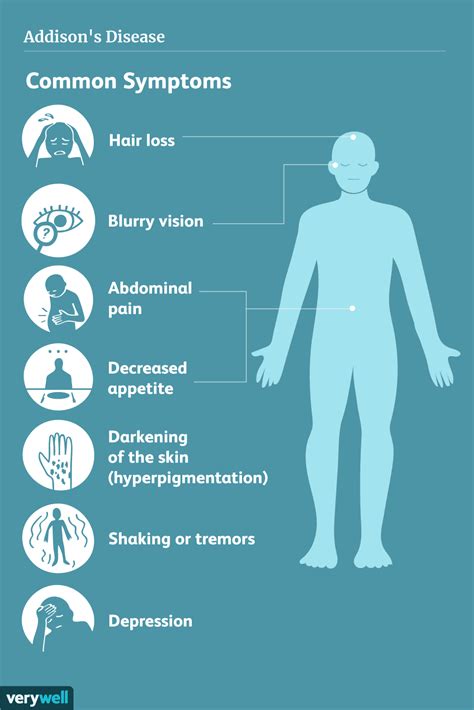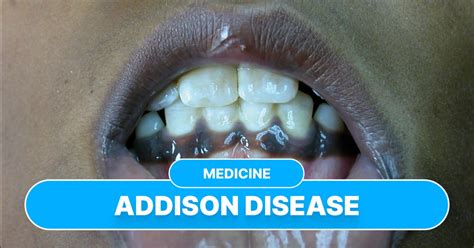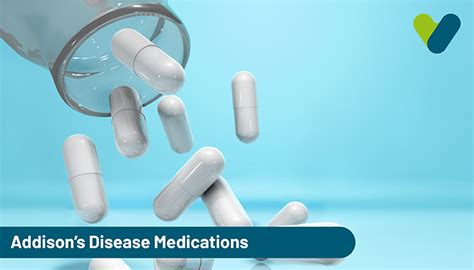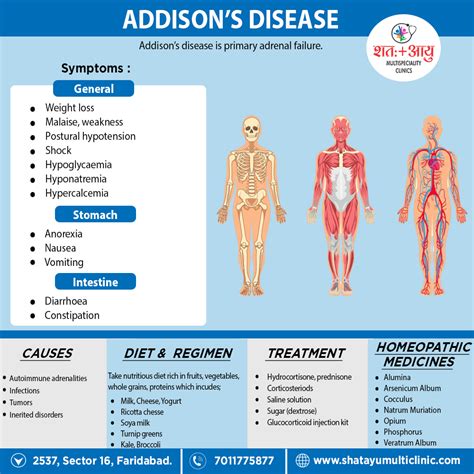Intro
Discover key facts about Addisons Disease, a rare adrenal disorder, including symptoms, diagnosis, and treatment options, to better understand this autoimmune condition and its impact on hormone regulation and overall health.
Addison's disease is a rare endocrine disorder that affects the adrenal glands, which are responsible for producing essential hormones such as cortisol and aldosterone. The disease is named after Thomas Addison, the English physician who first described it in the 19th century. Despite its rarity, Addison's disease can have a significant impact on a person's quality of life, making it essential to understand its causes, symptoms, and treatment options. In this article, we will delve into the world of Addison's disease, exploring its intricacies and providing valuable insights for those affected by it.
The importance of understanding Addison's disease cannot be overstated. As a chronic condition, it requires ongoing management and care to prevent complications and ensure a normal life. By learning more about the disease, individuals can better navigate its challenges and make informed decisions about their health. Moreover, raising awareness about Addison's disease can help reduce the stigma associated with it and encourage more people to seek medical attention if they suspect they may be affected. Whether you are a patient, a caregiver, or simply someone interested in learning more about this condition, this article aims to provide a comprehensive and engaging exploration of Addison's disease.
Addison's disease is often referred to as a "silent" disease, as its symptoms can be subtle and easily mistaken for other conditions. However, as the disease progresses, its effects can become more pronounced, leading to a range of complications that can be severe and even life-threatening. By understanding the warning signs and seeking medical attention early, individuals can receive timely treatment and prevent long-term damage. In the following sections, we will explore the key aspects of Addison's disease, including its causes, symptoms, diagnosis, treatment options, and management strategies.
What is Addison's Disease?

Causes of Addison's Disease
The causes of Addison's disease can be primary or secondary. Primary Addison's disease occurs when the adrenal glands are damaged, leading to a decrease in hormone production. This can be due to various factors, such as autoimmune disorders, infections, or tumors. Secondary Addison's disease, on the other hand, occurs when the pituitary gland or hypothalamus is affected, leading to a decrease in the production of adrenocorticotropic hormone (ACTH), which stimulates the adrenal glands to produce cortisol. This can be caused by conditions such as pituitary tumors, head trauma, or certain medications.Symptoms of Addison's Disease

Diagnosis of Addison's Disease
Diagnosing Addison's disease can be challenging, as its symptoms can be similar to those of other conditions. A combination of physical examination, medical history, and laboratory tests is used to confirm the diagnosis. These tests may include blood tests to measure cortisol and aldosterone levels, imaging studies to evaluate the adrenal glands, and stimulation tests to assess the adrenal glands' response to ACTH. A definitive diagnosis is typically made when the results of these tests indicate inadequate hormone production and adrenal gland dysfunction.Treatment Options for Addison's Disease

Management Strategies for Addison's Disease
Managing Addison's disease requires a comprehensive approach that includes medication, lifestyle changes, and regular monitoring. Individuals with the disease need to be aware of their condition and take steps to prevent complications, such as carrying a medical alert card, wearing a medical alert necklace, and keeping an emergency kit with them at all times. Regular follow-up appointments with an endocrinologist are also essential to monitor hormone levels, adjust medication as needed, and prevent long-term damage.Complications of Addison's Disease

Living with Addison's Disease
Living with Addison's disease requires a significant amount of planning, organization, and self-care. Individuals with the disease need to be mindful of their condition and take steps to manage their symptoms, prevent complications, and maintain a good quality of life. This may involve making lifestyle changes, such as avoiding strenuous exercise, managing stress, and getting regular check-ups with an endocrinologist. With the right treatment and management strategies, individuals with Addison's disease can lead normal, active lives and minimize the impact of the disease on their daily lives.Current Research and Future Directions

Conclusion and Final Thoughts
In conclusion, Addison's disease is a complex and multifaceted condition that requires a comprehensive approach to management and care. By understanding the causes, symptoms, diagnosis, treatment options, and management strategies, individuals with Addison's disease can take control of their condition and lead normal, active lives. As research continues to advance, we can expect to see new treatments and therapies emerge, improving patient outcomes and quality of life. If you or someone you know is affected by Addison's disease, we encourage you to seek medical attention, join a support group, and stay informed about the latest developments in the field.What are the common symptoms of Addison's disease?
+The common symptoms of Addison's disease include fatigue, weight loss, skin darkening, low blood pressure, and electrolyte imbalances.
How is Addison's disease diagnosed?
+Addison's disease is diagnosed through a combination of physical examination, medical history, and laboratory tests, including blood tests and imaging studies.
What are the treatment options for Addison's disease?
+Treatment for Addison's disease typically involves hormone replacement therapy, lifestyle changes, and regular monitoring to manage symptoms and prevent complications.
Can Addison's disease be cured?
+Currently, there is no cure for Addison's disease, but with proper treatment and management, individuals with the disease can lead normal, active lives and minimize the impact of the disease on their daily lives.
How can I manage my Addison's disease?
+Managing Addison's disease requires a comprehensive approach that includes medication, lifestyle changes, and regular monitoring. Individuals with the disease should work closely with their healthcare provider to develop a personalized management plan.
We hope that this article has provided you with a comprehensive understanding of Addison's disease, its causes, symptoms, diagnosis, treatment options, and management strategies. If you have any further questions or would like to share your experiences with Addison's disease, please feel free to comment below. Additionally, we encourage you to share this article with others who may be affected by the disease, and to join online support groups or forums to connect with others who understand what you are going through. By working together and raising awareness about Addison's disease, we can improve patient outcomes and quality of life for those affected by this condition.
